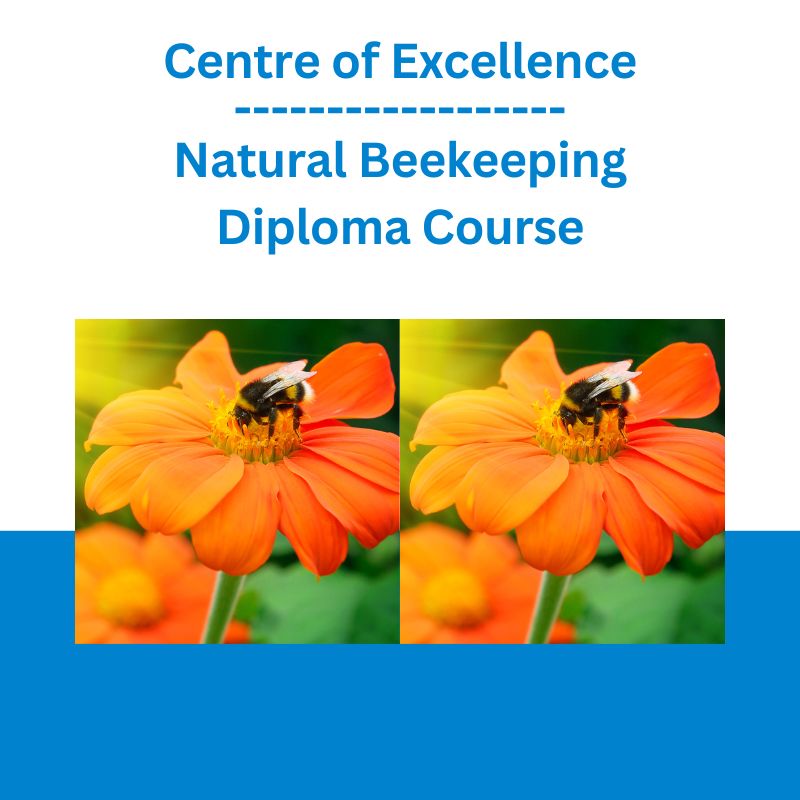*** Proof of Product ***
Exploring the Essential Features of “Centre of Excellence – Natural Beekeeping Diploma Course”
What Will You Learn?
Bees are intricately linked to our eco-system. Doing what we can to ensure their survival is not only a good, nature-friendly practice, but it’s a practical way to sustain our planet. So how do we help strengthen the bee population? Well, there is one particularly sound way to do this – beekeeping. The Natural Beekeeping Diploma Course aims to introduce you to the practical applications of beekeeping, focusing on how to do this in the most environmentally-responsible and bee-friendly way possible. From the course, you’ll gain an understanding of how to cultivate bee colonies that can thrive in and support the natural world.
The Natural Beekeeping Diploma Course begins by answering the question, ‘Why keep bees?’. From this, you’ll learn of the global and general reasons why bees are a necessity for our world and our lives – not just our habitats and food sources, but also our economy.
Learn how conventional and natural beekeeping differ and how (conventional) beekeeping came about. You’ll discover how the natural beekeeper puts the interests of the bee first, with honey-taking being secondary, while still maintaining bee colonies within hives.
For bees, the good of the colony comes before the individual. You’ll study bee society, looking at the bees’ duties, life cycles, reliance on one another, and various castes, looking at each of their purposes, behaviours and differing anatomies.
Why do bees make honey? How do they do it? The Natural Beekeeping Diploma Course answers these questions as you consider bees as gifted engineers and how they are capable of creating an incredibly efficient structure in which to hold their food, young, and themselves.
With all the knowledge you will gain from the course, you will no doubt want to put this to use. You’ll be guided through the essential equipment you’ll need to start beekeeping. You’ll learn about the different types of hive and the various types of equipment that can help you in your role as a beekeeper.
With your hive set up and all the necessary equipment ready, it’s time to move your new residents in, but how do you go about getting your bees? The Natural Beekeeping Diploma Course walks you through the different ways you can do this, with an emphasis on catching a swarm. We’ll then guide you through the duties involved in caring for your colony and hive. This includes ensuring adequate food supplies, protecting against pests, and advice for maintaining and repairing your hive.
Honey! There is none more delicious than that from your own hive. We take you step-by-step through the harvesting process. From the equipment you’ll need, the best time to harvest, and the actual process itself.
What can you do with all this lovely honey you’ve harvested? Plenty! We talk you through plenty of examples and recipes for you to follow. You’ll look at how it is used in beauty treatments, medicinal ointments, and food stuffs. You’ll also explore the uses for beeswax with recipes included for lip balm, candles and furniture wax.
If you want to engage with bees but don’t wish to become a beekeeper or haven’t got the space, the course can help you too. You’ll learn what you can do to ensure the survival of bees, how to create a perfect garden for pollinators and understand the importance of planting year-round flowers.
By the end of the course you will:
• Know the theory and practical techniques to use in cultivating natural bee colonies
• Have a greater understanding of the role of bees in the natural world
• Be more mindful of the threats to bees’ survival and how to counteract these
• Have a greater appreciation of the role that bees play in our environment, economy and survival
• Be informed of the main types of hives used by beekeepers
• Be aware of the basic beekeeping equipment you will need
• Know when and how to harvest honey from hives and extract it from honeycombs
• Have learned about the different pests and parasites that affect honeybees and how to deal with them naturally
• Understand how to catch a swarm of bees to cultivate as a colony
What will I learn on the course?
Module 1: Why Keep Bees?
7 parts
• Introduction
• Part 1: Bees’ Importance to the Eco-System and Economy
• Part 2: Why Are Bees Disappearing?
• Part 3: Beekeeping and the Benefits to You
• Test Your Knowledge
• Key Learning Points Exercise
• Module 1 Assessment
Module 2: What is Natural Beekeeping?
5 parts
• Part 1: How to Define Natural Beekeeping
• Part 2: Bee-Centred Vs. Conventional Beekeeping
• Test Your Knowledge
• Key Learning Points Exercise
• Module 2 Assessment
Module 3: Bee Basics
7 parts
• Part 1: Worker Bees
• Part 2: Drones
• Part 3: The Queen
• Part 4: Annual Cycle of the Bee Colony
• Test Your Knowledge
• Key Learning Points Exercise
• Module 3 Assessment
Module 4: Bees & Honey
6 parts
• Part 1: Honey and Pollen
• Part 2: The Anatomy of a Honeycomb
• Part 3: Foundation
• Test Your Knowledge
• Key Learning Points Exercise
• Module 4 Assessment
Module 5: Essential Beekeeping
5 parts
• Part 1: Definition and Types of Hives
• Part 2: Placing and Equipment
• Test Your Knowledge
• Key Learning Points Exercise
• Module 5 Assessment
Module 6: Sourcing Bees for Your Hive
6 parts
• Part 1: Where to Get Bees
• Part 2: How to Find a Swarm
• Part 3: Catching the Swarm
• Test Your Knowledge
• Key Learning Points Exercise
• Module 6 Assessment
Module 7: Taking Care of Your Hives
6 parts
• Part 1: Feeding Bees
• Part 2: Monitoring for Pests
• Part 3: Maintaining Bee Hives
• Test Your Knowledge
• Key Learning Points Exercise
• Module 7 Assessment
Module 8: How to Harvest Honey
6 parts
• Part 1: Equipment You Will Need
• Part 2: When and How to Harvest
• Part 3: Harvesting Wax and Pollen
• Test Your Knowledge
• Key Learning Points Exercise
• Module 8 Assessment
Module 9: Natural Honey and Beeswax Recipes
5 parts
• Part 1: Honey for Beauty and Health
• Part 2: Beeswax Recipes
• Test Your Knowledge
• Key Learning Points Exercise
• Module 9 Assessment
Module 10: How to Help Bees Without Being a Beekeeper
6 parts
• Part 1: Plant a Pollinator-Friendly Garden
• Part 2: Support Local Beekeepers
• Test Your Knowledge
• Key Learning Points Exercise
• Conclusion
• Module 10 Assessment
Who Would Benefit from This Course?
Beekeeping is a great hobby and learning about the working lives of bees can deepen your appreciation of the wonder of nature; it is an activity that can be engaged whether you are young or old.
Please see the full list of alternative group-buy courses available here: https://lunacourse.com/shop/










 Centre of Excellence - Chemistry Diploma Course
Centre of Excellence - Chemistry Diploma Course  Centre of Excellence - Metaphysics Foundation Diploma Course
Centre of Excellence - Metaphysics Foundation Diploma Course